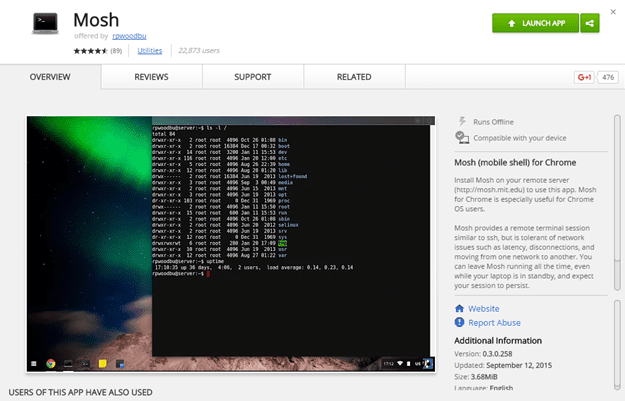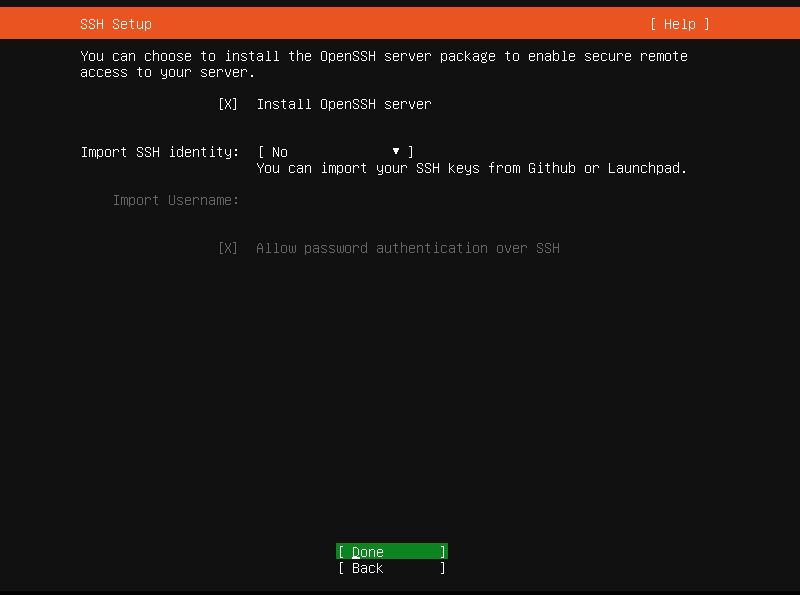

It from somewhere else? I could always use Remote Desktop, which actually works
UBUNTU MOSH SERVER WINDOWS
However, I’m usually not directly at my Windows machine. Meaning this is one of the easiest way to train models if you don’t have an

Windows, specifically training machine learning models. Instead of changing the LC_ALL variable for the entire shell, you can also use the following alias: alias mosh="export LC_ALL=\"en_US.With the introduction of WSL2, it’s now pretty easy to do great work inside of On my end, I'm connecting from a Pop!_OS 22.04 client environment to an Unbuntu 22.04 server environment Tip Presumably this leads to some confusion in the mosh application, whereas ssh doesn't fuss about it. However, various other variables where set differently: LANG=en_US.UTF-8 This was not intuitively obvious to me, when I first found this post.Īlso, to elaborate a bit further: as stated, in my situation LANG was already set to en_US.UTF-8. You do not make this change in the server environment, i.e. You make this change in the client environment, i.e. Setting the LANG variable had no effect (as on my end it already had the correct value).

I had to set the value of the LC_ALL environment variable to en_US.UTF-8. However, the work-around as provided by did not work for me. In that case, the system locale is the place to fix (see Locale in the Debian wiki). Your ssh connection could use a different value with the system locale than an interactive session using X (via gdm). My Debian servers do not have that file - and rely upon the default system locale and gdm (which can differ) to set the interactive locale. # lang.sh: Set interactive language environmentįor your particular servers (version not specified), the script may differ from one release to another. SuSE is different, making assumptions about ssh and gdm before reading essentially the same files: # "$HOME/.i18n" & sourced=1įor langfile in /etc/nf "$HOME/.i18n" do With Red Hat (CentOS) the script attempts to get information from system- and home-configuration, e.g., if then That script differs from one system to another, and is the second place (after the ssh/sshd configurations) to consider when looking for an explanation why locale information is not passed to a remote system. For root, that makes some sense because you would get into less trouble by select/paste copying.įor example, some systems use /etc/profile.d/lang.sh to set the locale for interactive use. Not all servers accept your locale variables via ssh.Įven with the configuration setup permissively, it's still possible (particularly since you are connecting to the root user) that someone has decided that the locale for that user should be POSIX. The remote sshd may ignore some of your environment depending on the setting of AcceptEnv in the configuration for sshd - or your user's SendEnv settings (in your ssh configuration). Which show that the server confirms variables which are used. While mosh apparently has no verbose- or debug-options, you can tell it what ssh command to use when connecting and by adding a -vvv option can have ssh show what locale variables it sends.įor example, starting with mosh -ssh='ssh -vvv' might see debug1: Sending env LC_ALL = Cįor POSIX, and debug1: Sending env LC_CTYPE = en_US.UTF-8 Mosh uses the locale environment supported by ssh. UPDATE2: I fixed it by adding LANG="en_US.UTF-8" UPDATE: The problem seem to be on Gentoo side, connecting to debian server produces same error, connecting using other distros works. On RHEL I have following locales: # locale usr/bin/mosh: Did not find mosh server startup message. The client-supplied environment () specifies Unfortunately, the local environment () specifies Both have mosh installed, however I get this error: ~/Documents $ mosh needs a UTF-8 native locale to run. I am trying to connect from my Gentoo to RHEL server.


 0 kommentar(er)
0 kommentar(er)
